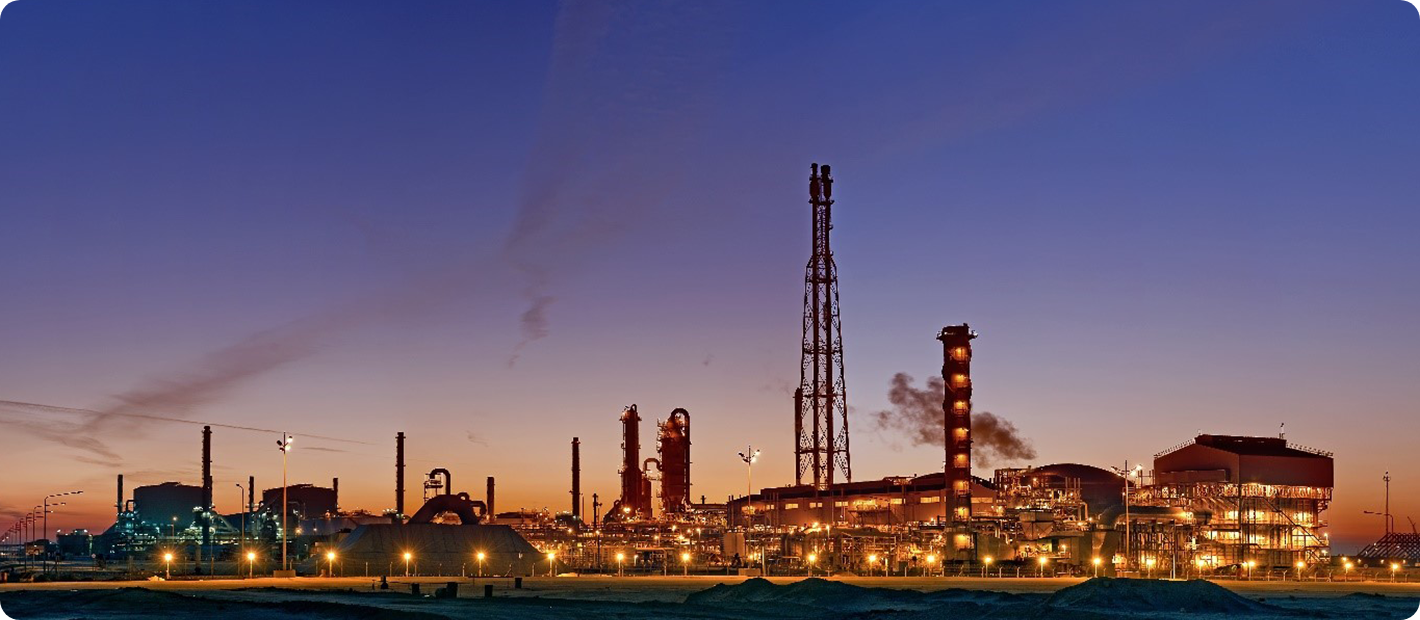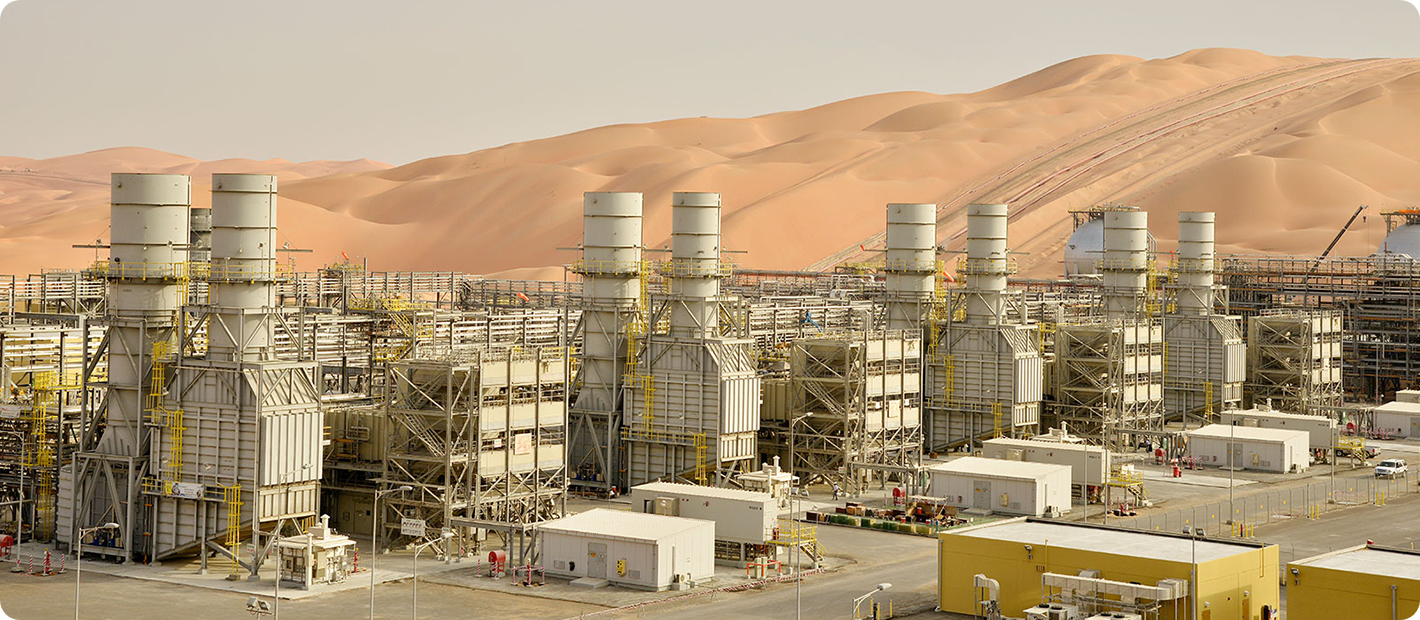

The Kingdom’s oil story began in May 1933, when the Concession Agreement for Oil Exploration and Production was signed between the government of Saudi Arabia and Standard Oil of California (SOCAL). In November of the same year, SOCAL established a subsidiary company for its concession management called the California Arabian Standard Oil Company (CASOC). In 1938, oil was discovered in commercial quantities in the Dammam field, where oil flowed at a rate of 1585 b / d from Dammam Well No. 7 (Well of Al-Khair).
In 1939, a new era culminated in the Kingdom, aboard the tanker “Dr. Scofield.” King Abdulaziz, the founder of modern Kingdom of Saudi Arabia, turned a valve to fill it with the first shipment of Saudi crude oil for export. The Ghawar field, the largest land-based oil field in the world, was discovered shortly afterwards, as was the Safaniya field in the waters of the Gulf – the world’s largest submerged oil field. Exploration, discovery, and development of the oil industry would eventually make the Kingdom the most important producer of oil in the world.
In 1944, CASOC’s name was changed to the Arab American Oil Company (Aramco). Its headquarters moved from New York City to Dhahran shortly afterwards in 1952. In 1973, the Saudi Arabian government bought a 25% stake in Aramco, increasing this share to 60% the following year. Ownership of Aramco completely transferred to the Kingdom's government in 1980, with ‘Saudi Aramco’ being formally established in 1988.
Since then, Saudi Aramco has transformed from an oil-producer to an integrated production, development and innovation powerhouse with global interests spanning chemical production, refineries and energy distribution. In 2019, Saudi Aramco took another major step, becoming a public joint stock company with shares traded on the Saudi Tadawul stock market.

The Kingdom began extracting natural gas to maximize the value of its oil extraction activities in the mid-1970s, with Aramco tasked by the Ministry of Energy (formerly the Ministry of Petroleum and Mineral Resources) to design and operate an integrated network to collect, process and transport natural gas in 1975. In the following years, comprehensive natural gas infrastructure was developed, forming a huge network of pipelines and three processing facilities which are the Barr, Othmaniyah and Shadqam gas plants. To enhance the added value of the energy sector, two natural gas liquids processing plants were built in Ju'aymah and Yanbu to supply feedstock to petrochemical projects. With these projects, the gas network and production sites were linked with demand centres throughout the Kingdom to enhance the efficiency of the hydrocarbon chain and increase gas network’s capacity to 3.5 billion standard cubic feet per day.
In 2001, the Hawiyah gas plant began operations, with a processing capacity of 1.4 billion standard cubic feet per day of non-associated gas. At that time, this single site enhanced the Kingdom's supply of gas, providing electricity to support the Kingdom’s growing economy. The Haradh gas plant was opened in 2003 to increase the gas network’s capacity to 9.5 billion standard cubic feet per day. In late 2015, production began at the Wasit gas plant, one of the largest gas plants in the Kingdom, with a total gas processing capacity of 2.6 billion standard cubic feet per day.
In the end of 2019, production began at the Al-Fadhili gas production plant, boosting total raw gas processing capacity to 2.5 billion standard cubic feet per day.
In 2020 AD, the development of the giant Jafurah field in the Eastern Province was officially announced, the largest unconventional non-associated gas field to be discovered in the Kingdom.

The discovery of oil in 1933 quickly led to the Kingdom occupying a leading position in the global petroleum industry. Saudi Arabia used this position to maintain stability in the global oil markets by working with international partners, including Kuwait, Iraq, Iran and Venezuela, to establish the Organization of Petroleum Exporting Countries (OPEC) in 1960. The Kingdom would later help found the Organization of Arab Petroleum Exporting Countries (OAPEC) in 1968.
The Ministry of Energy continues to supervise exploration work to facilitate oil and gas discoveries, and the Kingdom's huge oil reserves are subject to some of the lowest extraction costs in the world. Estimated at approximately 267 billion barrels, the Kingdom currently controls 19% of global oil reserves, 12% of global production, and more than 20% of oil sales in the global market. It also has refining capacity that reaches more than five million barrels per day, both domestically and via its international network. The influential role of the Kingdom plays in global energy flows was made clear during the COVID-19 pandemic, when it brokered the historic OPEC Plus agreement in order to ensure the continued stability of global energy markets

Natural gas is one of the most important natural resources which the Ministry of Energy is most focused on leveraging further, maximizing operations related to exploration, production and investment. Natural gas is increasingly being used to meet the growing demand for energy in the local market, particularly for the production of desalinated water as well its use in securing fuel and feedstock for manufacturing and other industrial sectors. Production of natural gas also results in the production of large quantities of ethane, natural gas liquids and condensates.
The Kingdom is currently the seventh largest natural gas market in the world. It has the lowest intensity of gas burning in gas plants in the world with less than 1% and plans to completely eliminate gas burning by 2030.

The Ministry of Energy - in coordination with The Electricity & Co-Generation Regulatory Authority - prepares policies and strategies for the electricity sector, supervising their implementation in a way that protects consumer rights and while nurturing economic growth, and maintaining community well-being.
In its role as regulator and central planner, the Ministry of Energy is responsible for determining the Kingdom’s energy mix. This is particularly relevant as Saudi Arabia displaces liquid fuel for energy generation in favor of natural gas and renewable energy sources. At the same time, the Kingdom is increasing the use of automation applications and smart network. Combined, the steps being taken by the ministry are ensuring electrical service reliability, lowering costs, strengthening the Kingdom’s power grid, encouraging fair and active private sector development, and ensuring power supplies reaches areas that were previously under-served. The ministry is also working to maximize the supply of local electrical goods and services, all while localizing jobs and supporting research and development activities related to the electricity sector.

The Kingdom has a distinct geographical and climatic location that makes utilizing renewable energy sources economically attractive, supporting Saudi efforts to diversify the domestic energy mix.
The National Renewable Energy Program (NREP) is a strategic initiative, launched at the direction of His Majesty the King as part of Vision 2030, which aims to increase the Kingdom's share of renewable energy production, achieve a balance in the mix of local energy sources, and fulfill the Kingdom's obligations towards reducing carbon dioxide emissions
Through the program, the Ministry of Energy is working to diversify the national energy mix used in electricity production, increasing the share of natural gas and renewable energy sources to approximately 50% by 2030 while reducing the use of liquid fuel.
The expansion of renewable energy in the Kingdom also presents an opportunity for the development of a new industry for renewable energy technology, supported by private sector investment and public-private sector partnerships. Accordingly, the Ministry is working to encourage the private sector to increase investment in the Saudi renewable energy sector
By creating a competitive local market for renewable energy, the Kingdom is building on its geographic strengths and obtaining the lowest prices in the world for renewable energy projects, particularly in wind and solar energy generation, further increasing the Saudi Arabia’s attractiveness as a destination for foreign investment.
The King Abdullah City for Atomic and Renewable Energy is working to develop and implement national plans to boost the role of atomic energy in the national energy mix, meeting the requirements of sustainable national development set out by Vision 2030 and enhancing the Kingdom’s reputation as an international energy pioneer.
Among the most important benefits of introducing atomic energy to the Kingdom is the diversification of energy sources, maximizing their positive impact on the economy and the environment. This strategic shift will help to maximizes the utilization of petroleum resources over time and for future generations. Atomic energy will also enable the Kingdom to better address challenges around issues including water scarcity, with more power made available for desalination activities.
The national atomic energy project launched by Saudi Arabia is fully consistent with the Kingdom's international obligations and its national policy to adopt peaceful nuclear technologies for the development and production of energy. Accordingly, the Kingdom maintains the strictest commitment to using the highest international standards related to nuclear safety and security, and has founded the Nuclear and Radiological Regulatory Commission to ensure the rigorous application of those standards.
The King Abdullah City for Atomic and Renewable Energy has also established a nuclear holding company as an independent legal entity concerned with achieving the aims of the National Atomic Energy Project in the Kingdom by participating and investing in economically viable projects locally and internationally.
Since its inception in 2010, the Saudi Energy Efficiency Center (SEEC) has focused on the development of a national program aimed at improving and raising the efficiency of energy consumption in three main areas which account for more than 90% of the domestic energy consumption. These are buildings, industry and road transport. The Center’s approach has included the launch of energy efficiency initiatives in cooperation with more than 30 governmental and semi-governmental agencies, leading to the development of more than 80 initiatives. In 2018, SEEC’s mandate was expanded to include the full scope of energy efficiency including electricity production and transmission as well as its use in water desalination. The SEEC is also responsible for improving efficiency in industrial processes which make use of feedstocks.
An important step towards greater energy efficiency in domestic industry saw the Kingdom’s application of comprehensive regulatory frameworks to more than 180 separate production facilities, helping to ensure the sustainable development of the Kingdom’s industrial capacity into the future. Improving the efficiency of buildings is also a major focus of government efficiency efforts, with 26 standards and regulations having been passed to improve energy usage. In addition, road transportation has benefitted from several initiatives designed to improve its sustainability.
These efforts were accompanied by the implementation of a number of key enablers such as the application of strict control measures for energy efficiency products, as well as the development of national capabilities through specialized and general training courses. Awareness campaigns were implemented at the national level, in addition to providing licenses to energy service companies that allow them to implement projects to audit and renovate buildings.

The Hydrocarbon Demand Sustainability Program (HDSP) was established under the umbrella of the Supreme Committee for Hydrocarbon Affairs, with the participation of several government agencies, research centers and related companies.
The program aims to sustain and develop the demand for hydrocarbons as one of the most important sources of energy during the coming decades by focusing on research and innovation to replace traditional materials with innovative materials derived from hydrocarbons. The HDSP will also help to increase access to energy in emerging markets, powering global growth and development. At the same time, the program will improve sustainability by raising the environmental and economic efficiency of hydrocarbons, in addition to improving added value in the current hydrocarbon supply chain.
The HDSP will work with the private sector to enhance the added value that can be achieved from hydrocarbons by deepening integration between the petroleum and petrochemical sectors, enhancing and consolidating the Kingdom's position in this sector.
The Kingdom launched the concept of a circular carbon economy during its Presidency of the G20 in 2020. The Kingdom’s plan for a circular carbon economy was subsequently endorsed by the G20 as an integrated and comprehensive framework to address the challenges of greenhouse gas emissions and manage them with various available technologies.
This approach represents a sustainable method for managing emissions using four methods – reduction, reuse, recycling and disposal – and harmonizes perfectly with Vision 2030 aims to achieve social and economic development across each of the Kingdom’s sectors including energy, industry, water, agriculture, and tourism. The Kingdom has adopted this circular carbon concept as a new way to achieve climate goals, and to encourage efforts aimed at not only reducing the accumulation of carbon emissions but also benefiting from them, all while limiting negative impacts on the environment and removing emissions from the atmosphere.
The CCEP supports the Kingdom's efforts to promote sustainable development and its pioneering role in the environmental field. Through it, the long-term utilization of the natural resources of the Kingdom of Saudi Arabia will be maximized, taking into account its responsibility towards the environment, in addition to developing the energy sector and raising its added value by exploiting carbon emissions and using them in other areas to safeguard economic development. Even before the launch of the CCEP, the Kingdom was considered one of the leading countries in the world in reducing the intensity of carbon emissions from the oil production business and the associated burner work.
Hydrogen is a fuel free of greenhouse gases, and as such it could play a major role in future energy mix shifts through a wide range of applications and potential uses. In industrial practices, for example, it is used as a fuel, but it can also be used to produce electrical energy or power transportation. Low greenhouse gas hydrogen can be produced from natural gas with carbon capture (blue hydrogen), or from renewable energy sources (green hydrogen)
Globally, the use of hydrogen is expected to reduce total emissions by 200 million tons per year by 2030 and 1600 million tons per year by 2050, in large part due to Saudi Arabia’s low-cost hydrocarbon resources and a strategic location for low renewable energy sources. For these reasons and more, it is expected that the Kingdom will be a world leader in the hydrogen economy and maintain its position as an energy leader in the twenty-first century.
Energy security and sustainability are of great importance, as the world is in constant need for energy in all its forms. The development of effective energy market policies that balance energy security and sustainability poses a major challenge to global decision-makers, and thus energy policies are a prominent topic among research centres and studies. The King Abdullah Petroleum Studies and Research Center (KAPSARC) plays an important role as it conducts research on energy and environment policies, economics and technologies, in addition to its leadership role in the concept of circular carbon economy, which was launched in cooperation with five research think tanks.
KAPSARC is also an intellectual and advisory center that acts as a supportive arm to the Saudi energy sector, providing advisory services to entities and authorities in the energy industry. KAPSARC’s services include the development of open-source templates and tools for researchers, academics, and decision-makers.
KAPSARC aims to become a globally recognized research center. Its team is comprised of experts from more than 20 nationalities, all of whom are working on research that will help the Kingdom achieve its Vision 2030 objectives, including raising the competitiveness of renewable energy and reducing carbon emissions.